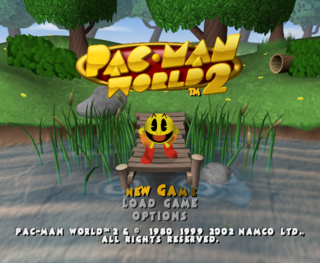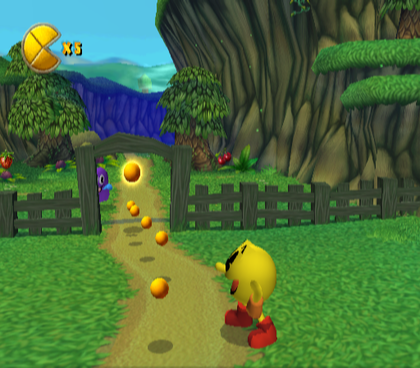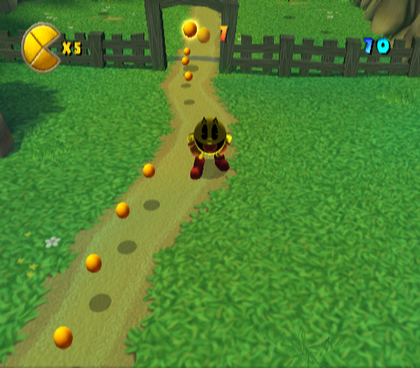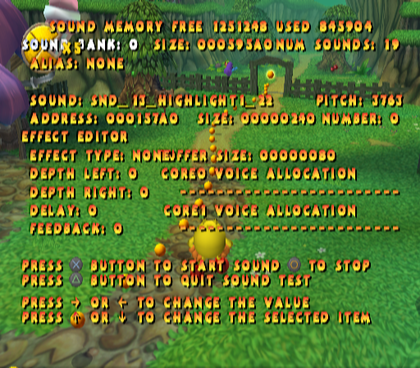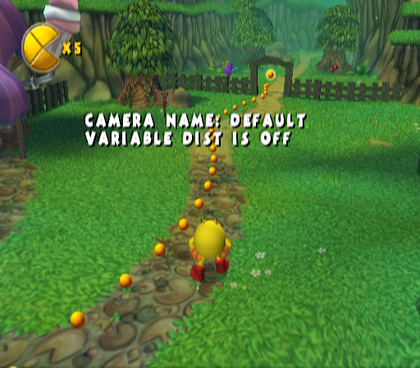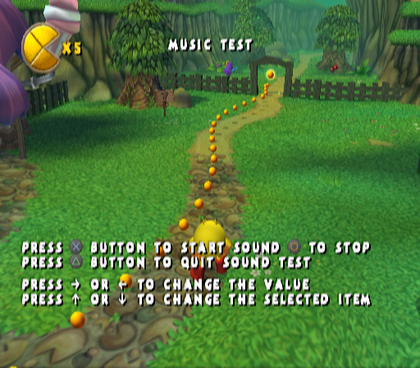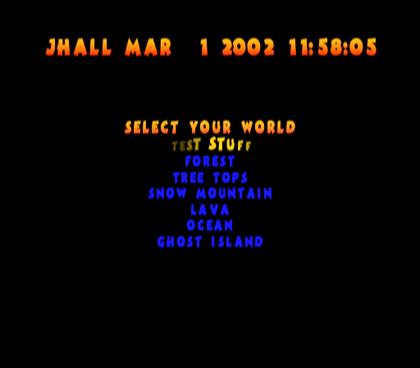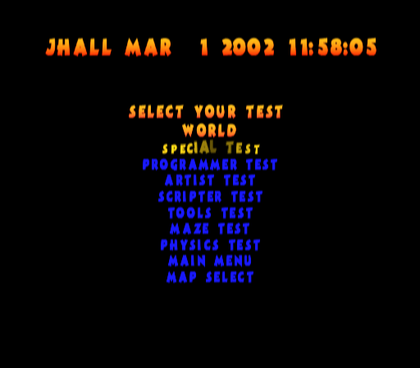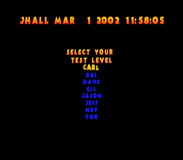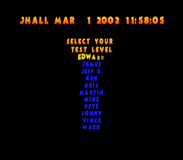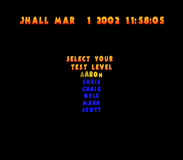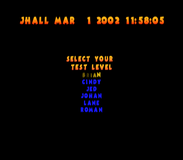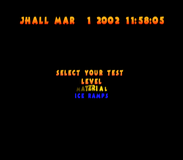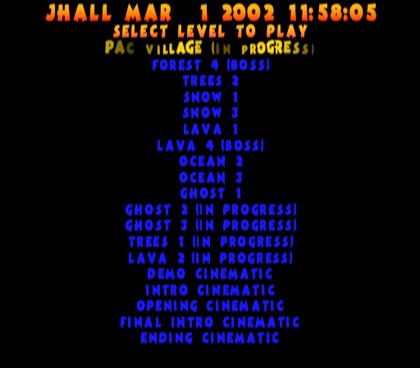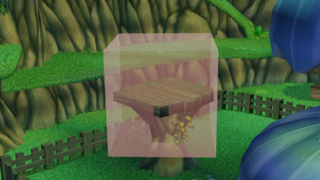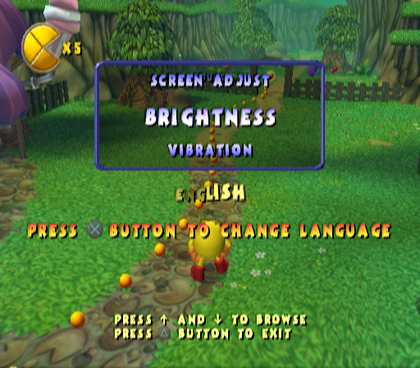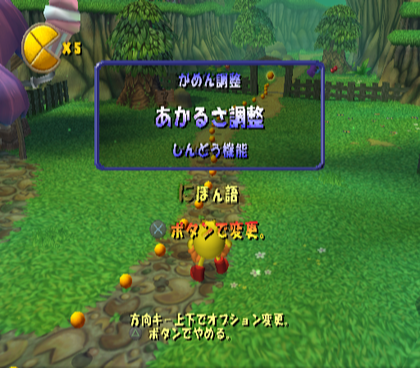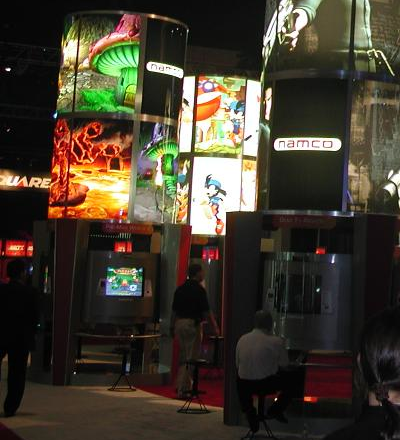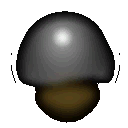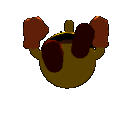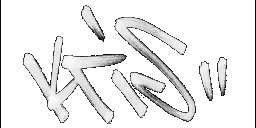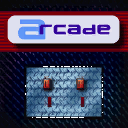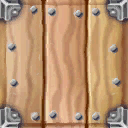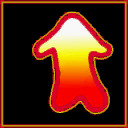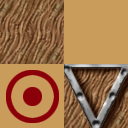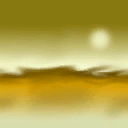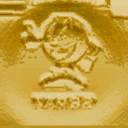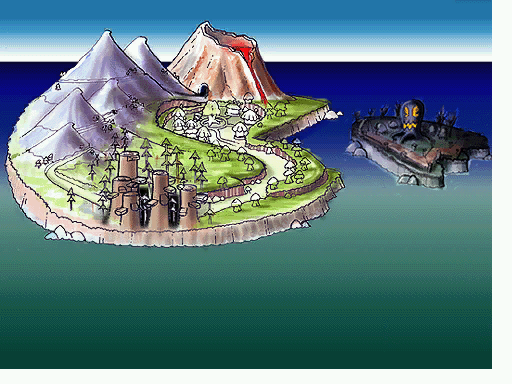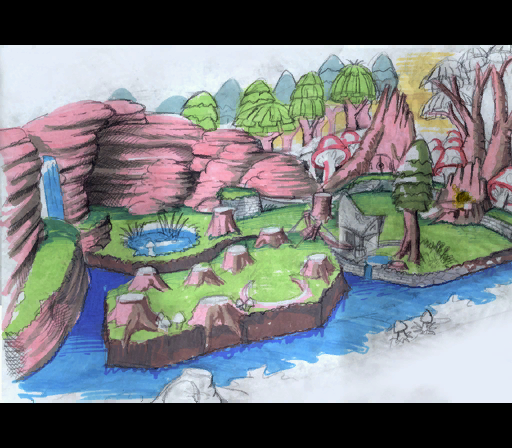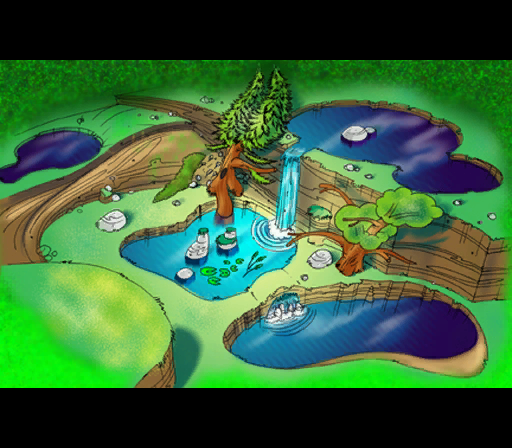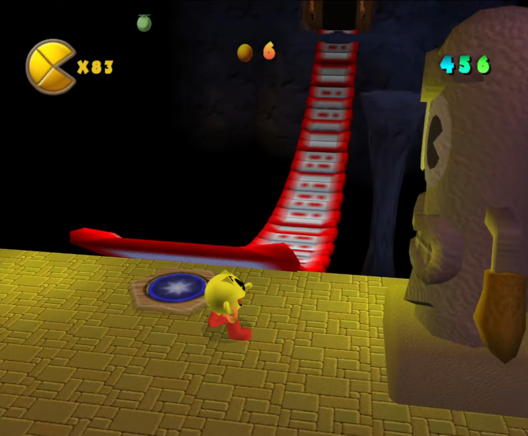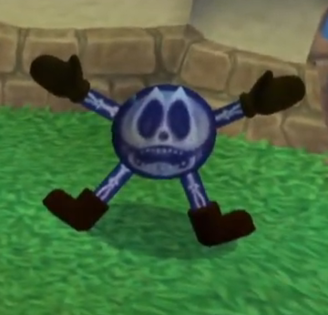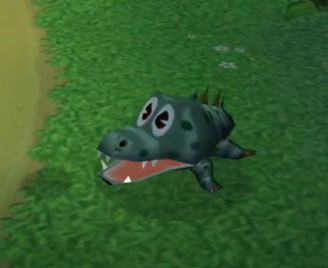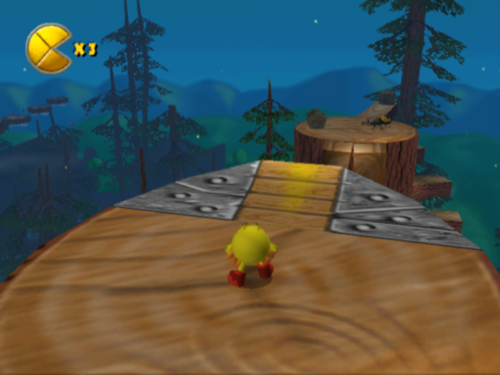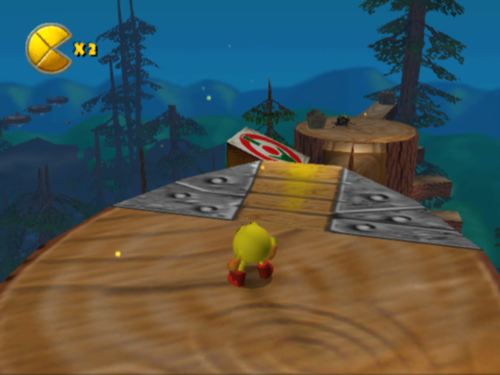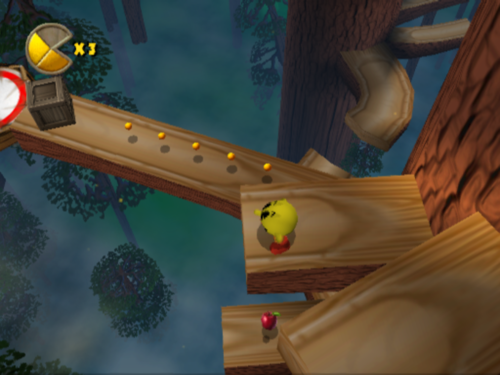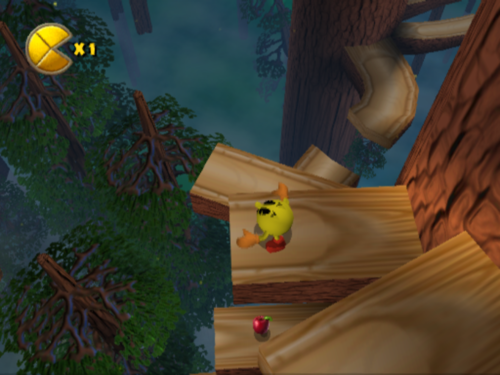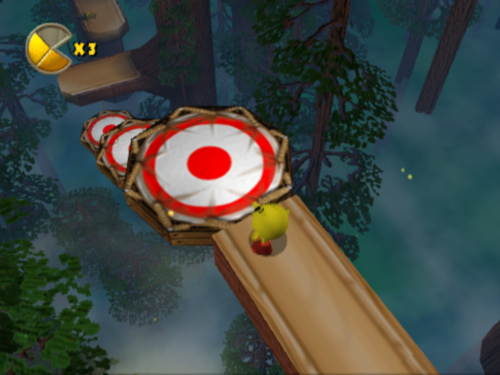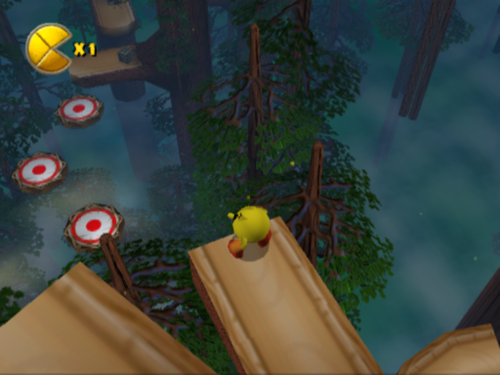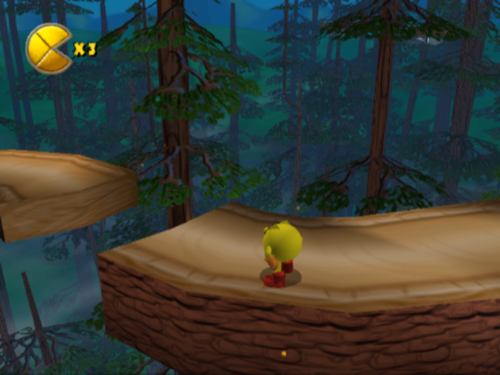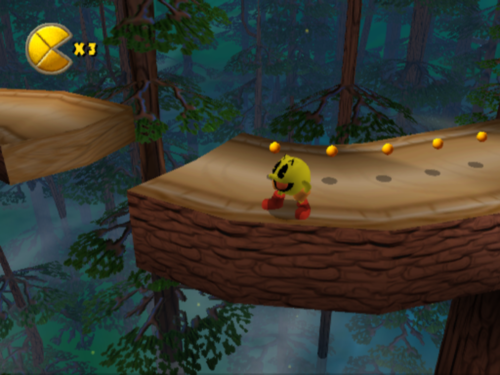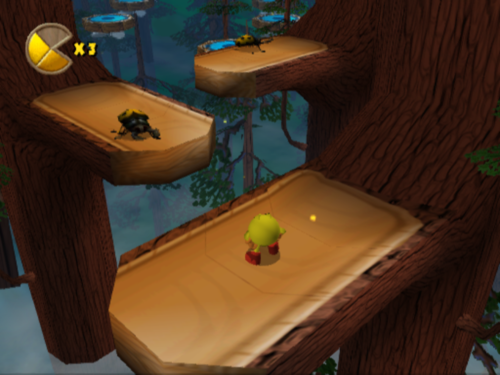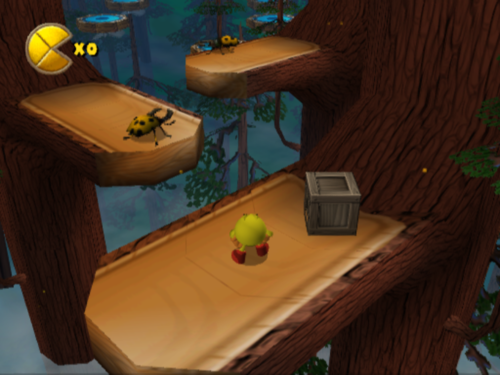Pac-Man World 2 (PlayStation 2, GameCube, Xbox, Windows)
| Pac-Man World 2 |
|---|
|
Developer: Namco
|
| This page sucks. If you could make it suck less, that would be awesome. Specifically: Needs a massive expansion and rewrite. |
To do:
|
Pac-Man World 2 is Pac-Man in THREE-DEE yet again. Hell yeah.
This time, the ghosts awaken a spooky spirit named… Spooky, from a tree after stealing some golden fruit, and Pac-Man needs to use his awesome THREE-DEE powers to get them back.
Contents
- 1 Debug Features
- 2 Hidden Cheats
- 3 Unused Language Options
- 4 Unused Punching Mechanic
- 5 Unused Text
- 6 Development Logs
- 7 Uncompiled Level
- 8 Pointless Batch Script
- 9 Early Menu Icons
- 10 Unused Textures
- 10.1 LogoSplash
- 10.2 Early Logo
- 10.3 Mellon2
- 10.4 Peach
- 10.5 Bell
- 10.6 Emptycup
- 10.7 blackant_refl1
- 10.8 bottom
- 10.9 brighten
- 10.10 bottom2
- 10.11 Platform
- 10.12 darrow1
- 10.13 testnumlava
- 10.14 bdoing03b
- 10.15 testpat1
- 10.16 leaf1
- 10.17 goldencherry
- 10.18 goldenfruit
- 10.19 splat_spawned
- 10.20 sign
- 10.21 Pookas
- 10.22 Ice River Run Placeholder Textures
- 10.23 Radar Mechanic
- 10.24 endlevel
- 10.25 coinmockup1
- 10.26 ps_butn
- 10.27 pc_butn
- 10.28 blank_butn
- 10.29 Start Button Textures
- 10.30 Mapp
- 10.31 Frog Pond Concept Art
- 11 Unused Hazards
- 12 Unused Models & Objects
- 13 Unused Enemies
- 14 Unused Sounds
- 15 Raw Maze Script File
- 16 Build Dates
- 17 Revisional Differences
Debug Features
Applying the below code will re-enable debug functionality. These will enable several debug menus. The code below is for the PlayStation 2 US (Greatest Hits) version of the game.
Re-enable Debug Menus E003FFED 005E4FC2 205A8960 00000001 201FA160 00000000 101FA170 0000E8B6 E003FF7D 005E4FC2 205A8960 00000001 201FA160 00000000 101FA170 0000EBBE E003FFDD 005E4FC2 205A8960 00000001 201FA160 00000000 101FA170 0000E862 E00AFFBD 005E4FC2 205A8960 00000001 202992D4 0C0A1A94 20286A50 27BDFFF8 20286A54 FFBF0000 20286A58 3C04003E 20286A5C 0C0557B6 20286A60 2484A4E8 20286A64 DFBF0000 20286A68 03E00008 20286A6C 27BD0008 E006F7FD 005E4FC2 205A8960 00000001 202992D4 0C05585A 20156178 0C0B434C 202D0D30 3C1E003E 202D0D34 03E00008 202D0D38 27DEA4E8 E004FFFB 005E4FC2 205A8960 00000000 202992D4 0C09B170 201FA160 06000006 201FA170 0807E7DE Re-enable Debug Arcade Unlock Buttons 20286A24 00000000 20286A2C 27BDFFF8 20286A30 FFBF0000 20286A34 0C0429FE 20286A38 00000000 20286A3C 0C042E24 20286A40 00000000 20286A44 DFBF0000 20286A48 03E00008 20286A4C 27BD0008 Enable Level Select (choose New Game) 2016299C 2404000? Replace ? with: 3 = regular level select 5 = old level select
With the codes on, while in-game press the following to enable debug menus:
- L3 + D-Pad Up for Sound Test.
- L3 + D-Pad Left for Camera Display.
- L3 + D-Pad Right for Music Test.
- L3 + D-Pad Down for Fog Editor.
- L3 + R1 for Lighting Editor.
- R3 to disable all menus.
- The level select menus will appear when starting a new game.
- Refer to the Debug Arcade Unlock section for information on the code, Re-enable Debug Arcade Unlock Buttons.
Fog Editor
This allows you to change fog settings. Use the D-Pad to change values. No text renders on-screen anymore.
Lighting Editor
Like the fog editor, this allows you to change light settings. Use the D-Pad to change values. No text renders on-screen anymore.
Sound Test
This allows you to change, view info and listen to sound effects loaded in the map.
Camera Display
This enables you to view the current camera settings.
Music Test
This would have allowed you to change music, but it doesn't appear to work.
Level Select
This enables a level select menu when starting a new game. The Testing Stuff category has no working levels anymore. It also contains various developer names as seen below.
Old Level Select
Despite what the options may imply, everything on this menu remains functional.
Debug Arcade Unlock
This code re-enables two debug button sequences to unlock arcade games. Pressing either L2, R2, L2, R2 will unlock one arcade game at any time during game or, pressing L2, R2, L2, R2, L3 will unlock the rest of the arcade games.
Hidden Cheats
In Pac-Village there’s a platform to the upper-right of where you spawn. When standing on top of the platform and pausing the game you can input the following cheat codes:
| Cheat | Windows | PlayStation 2 | Xbox | GameCube |
|---|---|---|---|---|
| +20 Lives | Move Forwards, Move Backwards, Camera Left, Camera Right | L1, L2, R1, R2 | L, White, R, Black | R, L, R, Z |
| +10 Tokens | Move Right, Move Left, Camera Up, Camera Right | R1, R2, L1, L2 | R, Black, L, White | Z, R, Z, R |
| All Levels | Move Left, Camera Left, Camera Up, Move Forwards | R1, R2, R1, R3 | R, Black, R, RS | L, R, L, Z |
| All Arcade Games | Camera Right, Move Right, Camera Down, Camera Right | R2, R1, L2, L1 | Black, R, White, L | L, Unknown1, L, Unknown2 |
| All Arcade Mazes | Camera Up, Camera Right, Move Forwards, Move Backwards | L2, L1, R2, R1 | White, L, Black, R | L, R, L, R |
| Museum Unlock | Camera Left, Move Right, Camera Down, Move Forwards | L1, L2, L1, L3 | L, White, L, LS | Unknown1, L, Z, R |
Unused Language Options
Present in the PlayStation 2 US (Greatest Hits) version of the game is an unused language option to set the displayed language as English or Japanese.
Change Brightness Settings to Unused Language Setting 201FB168 0807EC26 201FB16C 00000000
Unused Punching Mechanic
Found in the North American GameCube version is an unused punching animation. Although it's fully functional and can be reimplemented with a little hacking, it isn't very useful as there are very few enemies that it can kill while others are only briefly stunned.
Punch Gecko Code c20e4c40 00000014 9421fff8 7c0802a6 9001000c 3d20801e 3d60801e c1490110 c00da954 c16b0114 c1a30194 ec0002b2 c1830024 ec0002f2 edad6028 fc0d0000 4181004c 800da95c 2c000000 40820040 800da93c 2c000000 40820034 80830140 80a30190 38600000 2c030000 40820020 3d208039 3d608022 a1495550 38600001 800b9db0 7d490039 40820008 38600000 8001000c 7c0803a6 38210008 4e800020 60000000 00000000
Unused Text
The cinema files for the Pinky and Clyde boss fights in the GameCube version are somewhat messy and contain several pieces of commented-out unused dialogue, some of which was meant to be used for the other bosses, indicating that the cinema scripts were copy-pasted, reworked to fit the current boss, and any leftover dialogue from a previous boss was commented-out.
Inky (Inky's Blade-O-Matic)
| Speaker | Unused | Used |
|---|---|---|
| Inky | PACMAN, I'LL GET YOU! YOU WILL NEVER BE ABLE TO REACH ME UP HERE. HAHAHA!!! EAT SAWBLADES! |
Come for the Golden Fruit, Pac-Man? Spooky wanted me to think of a good cut-down if you ever got to me. |
| Pac-Man | HMMM. I'LL USE THOSE B-DOINGS!!! THEN I'LL GET THAT GOLDEN FRUIT! |
HMMM. That contraption doesn't look very strong. Some rev rolls into the body or butt-bounces on the glass should do the trick. |
The cinema files for the Clyde boss fight contain a rough draft of the dialogue for the Inky boss fight.
Pinky (Pinky's Revenge)
HMMM. I'LL USE THOSE B-DOINGS!!! ...YOU CAN'T STAY UP THERE FOREVER! THEN I'LL GET THAT GOLDEN FRUIT!
Pac-Man was meant to say this after Pinky's introduction. He doesn't say anything in the final game.
I'LL KNOCK YOU OFF THAT PLATFORM!
As shown by multiple commented-out lines, Pinky would've said this borrowed Inky dialogue as a placeholder for indicating the beginning of the second, third, and fourth phases during the early stages of the fight's development.
Clyde (Clyde in the Caldera)
THAT GLASS DOME LOOKS PRETTY FLIMSY ...YOU CAN'T STAY UP THERE FOREVER! THEN I'LL GET YOUR GOLDEN CHERRY!
Pac-Man was also meant to say this after Clyde's introduction. He doesn't say this in the final game.
NOW YOU CAN EAT FLAME ROUND ONE!
Much like Pinky, multiple commented-out lines show that Clyde also would've said this placeholder dialogue to indicate the beginning of the second, third, and fourth phases during the early stages of the fight's development. Oddly, it never changes to "ROUND 2" or "ROUND 3".
Yellow Pac-Marine Intro
An earlier English cinema file for Yellow Pac-Marine's intro can be found in the Japanese version of the game. Unlike the final cinematic, Pac-Man actually talks in this one, which explains why the camera angle changes to face Pac-Man in the final version.
Development Logs
Some of the level files have logs from a tool used to compile collisions.
| Download Pac-Man World 2 (PS2) FeedBack
File: PacmanPS2-FeedBack.zip (Compressed: 18.5KB; Uncompressed: 68.5KB) (info)
|
Uncompiled Level
The archive arcadeint.rar contains an uncompiled map file.
| Download Pac-Man World 2 (PS2) Uncompiled Arcade Level
File: PacManPS2-UncompiledLevel.zip (Compressed: 133KB) (info)
|
Pointless Batch Script
The GameCube version contains a file called two.bat in the netdata/music folder. This batch file performs the following for all files passed in as arguments:
1. It renames the file to "foo", or moves it to a "foo" folder if one exists.
2. It copies the contents of the file that was just renamed or moved back into its original location with its original name, but it appends a second copy of the file.
3. It deletes the contents of the "foo" file or folder.
This should cause all files passed to this batch file to be effectively "doubled".
@echo off for %%i in ( %* ) do ( move %%i foo copy /b foo+foo %%i del foo )
Early Menu Icons
Within the objects folder of the GameCube version is a folder titled "menustuff", this folder contains numerous unused menu assets, including several icons that were likely made specifically for the E3 2001 demo's menu. Given the existence of duplicate icons, as well as their names, it's probable that some of these icons were used as placeholders for other menu options that were never fully implemented.
For reference, here is a photo of the E3 demo's menu. There's a high likelihood that this icon system was how the menu was originally intended to function.
extrasicon
This texture itself appears to be an earlier version of Frogpondicon, but it's unclear what these "extras" were.
Frogpondicon
When selected, this icon almost definitely would've taken the player to the scrapped "frog pond" level. While very similar to extrasicon, this icon adds heavier shading to the frog's mouth. Other than this, they're identical.
arcadeicon
As the name implies, this Ice River Run icon was possibly a placeholder texture, and used to access the arcade.
frpond1icon
The name suggests that this icon was likely an early placeholder for the frog pond icon.
mountainicon
This icon was, no doubt, used for Ice River Run.
mountainicon2
While very similar to mountainicon, this icon has a botched alpha channel, along with the frozen Pac-Man model being flipped to the left.
optionsicon
Its functionality is pretty self explanatory.
pacmanicon
This icon has a different filename, but is identical to optionsicon.
questicon
Since the final release still refers to the story mode as a "quest", it can be inferred that, when selected, this icon would have began the story mode. This texture is identical to frpond1icon.
Unused Textures
LogoSplash
Also included in the folder "menustuff" folder is what could potentially be a version of the main menu that was used during earlier stages of development. This is supported by the empty space on the right which could be where the different options were placed, and the sketch of a dock in the background similar to how Pac-Man is standing on a dock in the final title screen.
Early Logo
The last unused asset included in "menustuff" is this early version of the logo. It is distinct from the logo seen in "LogoSplash", being completely original instead of the logo from the first game with a two added on. It had been broken up into 4 128x128 pixel images, along with a version of the final logo that was in a similar state. This is what it looks like pieced back together.
| Early Logo | Final Logo |
|---|---|
Mellon2
The chest folder, also located within the objects folder, contains fruit textures used for the chests. Among these textures is a slightly yellow version of the melon. Oddly, both melon textures in this folder are spelled as "mellon".
| Unused Melon | Final Melon |
|---|---|
Peach
Also hidden in the chest folder is an unused peach texture named "apple2".
Bell
Amid the fruit, a folder and texture for an unused bell can be found Pac-Man's status folder in the PS2 version of the game. Commented-out scripts for a bell chest exist in Volcanic Panic's level script, so the bell definitely is a scrapped "fruit".
Emptycup
A folder and texture for this Emptycup can also be found Pac-Man's status folder in the PS2 version. It's unclear if it was a collectable "fruit" or if it had more complex functionality.
blackant_refl1
Unclear what this texture is, however it might've had something to do with the scrapped anteater enemy.
bottom
Found in Ghost Bayou's level data, this texture was certainly used as a crude placeholder for Pac-Man's water reflection 3D model.
brighten
This signature belonging to Kris DeMartini (PMW2 Artist) can also be found in Ghost Bayou's level data.
bottom2
While still technically used, the coin door is the only part of the texture that can be seen in-game.
Platform
Earlier version of the helivator texture. It shares a resemblance to the ramps in Blade Mountain.
darrow1
Placeholder texture used to see if lava was flowing correctly.
testnumlava
Another placeholder texture used to see if lava was flowing correctly.
bdoing03b
An extremely early placeholder B-doing texture.
testpat1
Early placeholder texture for the directional B-doing.
leaf1
In the GameCube version, this leaf texture is present in every level's data. This texture is possibly a leftover from the scrapped "leafpile" mechanic or maybe was a scrapped environmental effect.
goldencherry
Early placeholder reflection texture for the golden fruit. Despite its odd appearance, it's a crude, but serviceable reflection texture.
goldenfruit
A more final golden fruit reflection texture. Strangely, the final game simply uses Pac-Man's steelball reflection texture, which ends up giving the golden fruit a more brass-like appearance.
splat_spawned
An unused addition to the splatter effect that appears when crushing a pacasite, beetle, or spider.
sign
A ghost island variant of the sign, possibly meant for a scrapped version of the sign as its layout doesn't work with the regular sign.
Pookas
These three textures can be found in Pooka's folder within the objects folder. Unlike other unused textures it's unclear what these were for.
Ice River Run Placeholder Textures
Radar Mechanic
The data for both Yellow Pac-Marine and Megawhale contain textures and an accompanying sound effect for a scrapped radar mechanic.
endlevel
Found in Treewood Forest's data, this texture was possibly a placeholder for the rock structure at the end of the level, but it's unclear where exactly it was.
coinmockup1
This early token texture can also found in Treewood Forest's data.
ps_butn
This texture be found in the PC port's data. Strangely, it's different than the PS2 version's PlayStation buttons texture, meaning that this is possibly an earlier version of the texture or that it was made specifically for the PC port. For whatever reason, it's never used in-game, even when using a PlayStation controller.
pc_butn
Unused keycaps texture from the PC port. The final game forgoes textures and instead uses text prompts.
blank_butn
A blank version of the keycaps was also left in the PC port's data
Start Button Textures
These unused textures can be found in their respective versions of the game.
Mapp
An older version of the map we can see in the concept art museum can be found in the "map" folder inside the game's "objects" folder. The biggest difference between the original and final version (aptly named "mapredo") being the submarine and Megawhale additions, giving credence the theory that the submarine levels were added late in development.
| Original Map | Final Map |
|---|---|
Frog Pond Concept Art
Two pieces of concept art for the game's only known scrapped level, Frog pond, are present in the concept art museum's data. It's possible they weren't used in the final game because the player wouldn't have a point of reference for what the art actually depicts.
"Frog2"
And "Frogpond"
Unused Hazards
Electric Frontier
Electric Frontier was an electrical current that, if touched, would electrocute Pac-Man, momentarily stunning him and quickly swapping his model with a burned, x-ray-like skeleton version of Pac-Man, titled "pacskull". Smoke would also plume from Pac-Man when in this state. While still functional, pacskull's textures do not appear, and are replaced by random textures from the level if Electric Frontier is reactivated. Night Crawling is the only level where it was definitively used.
Ropebridge2
An unused rope bridge that's platforms drop as soon as Pac-Man walks across them; if butt-bounced, the entire bridge collapses. It was supposed to be used in Treewood Forest and Butane Pain but ended up getting replaced with net bridges. None of its textures remain on the disc.
Unused Models & Objects
Pacskull
This x-ray-like skeleton version of Pac-Man would've appeared when Pac-Man was electrocuted by Electric Frontier
Unused Enemies
Gator
The Gator walks around, occasionally idling, but if Pac-Man gets too close then it rushes towards Pac-Man while chomping, damaging Pac-Man if the Gator touches him.
Unused Sounds
67_pookapanic_v2_22
Meant to be used for the Pookas, possibly for when they blew up or got eaten by the Pooka Plant.
16_error3_22
Sounds similar to the sound Pac-Man makes when taking damage in the original Pac-Man World. Most likely, it was used as a placeholder.
88_bitterdeath1_22
Meant for the Pac-Asites when defeated by Pac-Man.
radarping
Would've been used for when Megawhale was picked up on the radar.
Raw Maze Script File
The netdata/maze5b folder in the GameCube version contains a file called script.txt, which looks to be a raw script file for one of the mazes. The script oddly refers to it as maze 5a, and the last line of the file consists of unprintable characters.
;==================================================================
;======================+++++++++++++===============================
;====================== M A Z E # 5a ===============================
;======================+++++++++++++===============================
msg_init action_makeEcho(ECHO_STUDIO_B,0,0,20,40)
msg_init action_SoundPlay(SND_AMB_WAVES)
;msg_init action_SoundPlay(SND_AMB_WATERFALL_MAZE)
msg_init action_makeRandomSounds (1, 2, SND_AMB_WATERDRIP_DRY1, SND_AMB_WATERDRIP_DRY2, SND_AMB_WATERDRIP_DRY3)
maze = msg_init action_makeBoxMaze(maze_bnd,23,18,start_pnt,MAZE_LEFT) ; Init of Maze
;++++++++++++++++++++++++ Fruit ++++++++++++++++++++++++++++
msg_init action_awardMazeFruit(MELON, 30, 1000, 10.0)
msg_init action_awardMazeFruit(MELON, 70, 1000, 7.5)
;++++++++++++++++++++++++Power Pellets++++++++++++++++++++++++++++
msg_init action_setMazeDot(power1_pnt,MAZE_POWER_PELLET,maze) ; Put PowerPellet
msg_init action_setMazeDot(power2_pnt,MAZE_POWER_PELLET,maze)
msg_init action_setMazeDot(power3_pnt,MAZE_POWER_PELLET,maze)
msg_init action_setMazeDot(power4_pnt,MAZE_POWER_PELLET,maze)
msg_init action_setMazeDot(power5_pnt,MAZE_POWER_PELLET,maze)
msg_init action_setMazeDot(nodot1_pnt,MAZE_NONE,maze)
msg_init action_setMazeDot(nodot2_pnt,MAZE_NONE,maze)
msg_init action_setMazeDot(nodot3_pnt,MAZE_NONE,maze)
msg_init action_setMazeDot(nodot4_pnt,MAZE_NONE,maze)
msg_init action_setMazeDot(nodot5_pnt,MAZE_NONE,maze)
msg_init action_setMazeDot(nodot6_pnt,MAZE_NONE,maze)
msg_init action_setMazeDot(nodot7_pnt,MAZE_NONE,maze)
msg_init action_setMazePathSecurityLevel(nogodown1_pnt,MAZE_DOWN,ONLY_EYES,maze)
msg_init action_setMazePathSecurityLevel(nogodown2_pnt,MAZE_DOWN,ONLY_EYES,maze)
msg_init action_setMazePathSecurityLevel(nogoup1_pnt,MAZE_UP,ONLY_EYES,maze)
;++++++++++++++++++++++++++++++++GHOST+++++++++++++++++++++++++++++++++++++
msg_init action_putMazeDot(maze) ; Put Dots on Maze
clyde = msg_init action_makeMazeGhost(ghost1_pnt,4.0,ghost1_pnt,target2_pnt,left_pnt,PINKY,maze,self) ; Put ghosts
msg_init action_makeMazeGhost(ghost2_pnt,2.0,ghost2_pnt,target3_pnt,left_pnt,INKY,maze,clyde)
msg_init action_makeMazeGhost(ghost3_pnt,6.0,ghost3_pnt,target1_pnt,left_pnt,BLINKY,maze,self)
msg_init action_makeMazeGhost(ghost4_pnt,0.0,ghost4_pnt,target4_pnt,left_pnt,CLYDE,maze,self)
msg_init action_CameraBox(Maze,maze_bnd,180) ; Inits Camera for Maze
;-------------------- pool -----------------------
;***** Transparancy *****
msg_init action_changeVU1TransparencyMode(water1,TMODE_BRIGHTEN)
msg_init action_trueTransparency(water1, 1)
msg_init action_changeVU1TransparencyMode(water2,TMODE_BRIGHTEN)
msg_init action_trueTransparency(water2, 1)
;***** UV Anim *****
;msg_init action_makeUVAnim(water1,-0.2,-0.3)
;msg_init action_makeUVAnim(water2, 0.3,0.4)
;-----------========= FOG ==========-------------
msg_init action_setFog(71,105,97,600.0,900.0)
msg_init action_setUnderWaterFog(8,32,102,100.0,500.0)
;-------------------reflect-----------------
;***** Transparancy *****
msg_init action_changeVU1TransparencyMode(reflect1,TMODE_BRIGHTEN)
msg_init action_trueTransparency(reflect1, 1)
;***** UV Anim *****
;msg_init action_makeUVAnim(reflect1,0.1,0.2)
;+++++++++++++++++++++++Shark++++++++++++++++++++++++++++++++++++
msg_init action_makeShark(shark1_pnt,200,15)
msg_init action_makeShark(shark2_pnt,30,15)
msg_init action_makeShark(shark3_pnt,50,15)
msg_init action_makeShark(shark4_pnt,70,15)
;===================== Sewer Water Dumps========================
;***** Transparancy *****
msg_init action_changeVU1TransparencyMode(waterdump1,TMODE_BRIGHTEN)
msg_init action_trueTransparency(waterdump1, 1)
msg_init action_changeVU1TransparencyMode(waterdump2,TMODE_BRIGHTEN)
msg_init action_trueTransparency(waterdump2, 1)
msg_init action_changeVU1TransparencyMode(waterdump3,TMODE_BRIGHTEN)
msg_init action_trueTransparency(waterdump3, 1)
msg_init action_changeVU1TransparencyMode(waterdump4,TMODE_BRIGHTEN)
msg_init action_trueTransparency(waterdump4, 1)
;***** UV Anim *****
msg_init action_makeUVAnim(waterdump1,0.0,-1.9)
msg_init action_makeUVAnim(waterdump2,0.0,-1.0)
msg_init action_makeUVAnim(waterdump3,0.0,-1.0)
msg_init action_makeUVAnim(waterdump4,0.0,-1.9)
;========Mist===============
msg_init action_makeMistBox(mist1_bnd,150,25.0,.2,1.0,180,190,180,20)
msg_init action_makeMistBox(mist2_bnd,150,25.0,.2,1.0,180,190,180,20)
;============Drips================
temp = msg_init action_makeScriptableVU1(bigdrip1)
;temp2 = msg_init action_makeScriptableVU1(bigdrip2)
msg_init action_changeVU1TransparencyMode(drip1,TMODE_BRIGHTEN)
msg_init action_trueTransparency(drip1, 1)
msg_init action_changeVU1TransparencyMode(drip2,TMODE_BRIGHTEN)
msg_init action_trueTransparency(drip2, 1)
msg_init action_changeVU1TransparencyMode(bigdrip2,TMODE_BRIGHTEN)
msg_init action_trueTransparency(bigdrip2, 1)
msg_init action_changeVU1TransparencyMode(bigdrip1,TMODE_BRIGHTEN)
msg_init action_trueTransparency(bigdrip1, 1)
msg_init action_suspend(temp)
;msg_init action_suspend(temp2)
msg_init action_makeUVAnim(drip1,1.8,9.0)
msg_init action_makeUVAnim(drip2,1.3,0.0)
msg_init action_makeUVAnim(bigdrip1,1.7,0.0)
msg_init action_makeUVAnim(bigdrip2,1.55,0.0)
Build Dates
A build date can be found in the game's executable file.
| To do: Find dates for the European versions. |
| Version | Hex Address | Build Date |
|---|---|---|
| PlayStation 2 | 0x4A0DB8 | Jan 3 2002 16:07:13 |
| GameCube | 0x1EC674 | Jan 10 2002 13:42:26 |
| PlayStation 2 (Greatest Hits) | 0x4A0DB8 | Mar 1 2002 11:58:05 |
| PlayStation 2 (JP) | 0x4A0DB8 | Apr 1 2002 16:19:23 |
| Xbox | 0x1E5D0C | Aug 2 2002 19:15:57 |
| Windows | 0x29FB90 | Mar 11 2004 16:55:22 |
Revisional Differences
Original PS2 Release
For whatever reason, all reissuings of the PS2 release (later black label copies, all Greatest Hits, etc.) reduced difficulty by a huge margin. The GameCube, PC and Xbox releases, most likely due to their later release date, got the easier of the two (same for the European releases).
| This needs some investigation. Discuss ideas and findings on the talk page. Specifically: The longest video documentation of the original release I've found so far goes through Treewood Forest, so later levels may have other changes not stated here yet. Also, screenshots would be nice. |
General
- The player begins the game with 3 lives in revision 0. This was increased to 5 lives in revision 1.
- Ghosts kill in one hit in revision 0, regardless of Pac-Man's health, just like in the oldest Pac-Man games. This upped the difficulty just about everywhere, as well as making the Health Wedge in Pac-Village basically pointless (unless you somehow hurt yourself trying to kill the Pac-asites).
- Score tallying animations don't play for level/global high scores in revision 0, leaving boss levels with no animations at all.
- The steel ball power-up lasts for 20 seconds in revision 0, which was increased to 30 seconds in revision 1.
Forest
- The sign in The Bear Basics that tells the player to Butt-Bounce on the nearby Pac-Cub incorrectly calls it a Pac-Bear in revision 0.
- RGBs, the dragon-like enemies that appear in Canyon Chaos and Pac-Dot Pond, need to be Butt-Bounced twice in quick succession in revision 0 in order to kill them. This was reduced to a single Butt-Bounce in revision 1, although they will still disappear faster if hit twice.
- Blinky's boss battle is named "Blinky's Killer Frog" in revision 0, which was shortened to just "Blinky's Frog" in revision 1 to match its name in the HUD.
- Blinky's dialogue was reworked in revision 1 to add additional hints.
| Revision 0 | Revision 1 |
|---|---|
| BLINKY: AS LONG AS IT DOESN'T BREAK ... | BLINKY: AS LONG AS YOU DON'T BUTT-BOUNCE ON IT ... |
| BLINKY: LET'S SEE HOW YA DEAL WITH STEEL! | BLINKY: LET'S SEE HOW YA DEAL WITH STEEL!
BLINKY: AND DON'T EVEN THINK OF REV ROLLING! PAC-MAN: ( WHAT'S THAT GLOWING THING IN HIS MOUTH? ) |
- Blinky's frog swings its wooden tongue dramatically faster in revision 0.
- In revision 1, the inside of the frog's mouth glows to telegraph its weak point.
Treetops
B-Doing Woods
This level is filled with minor alterations.
- A huge safety net was added in revision 1 to the very beginning of the level.
| Revision 0 | Revision 1 |
|---|---|
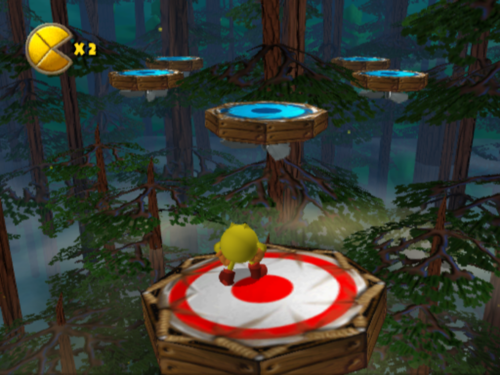 |
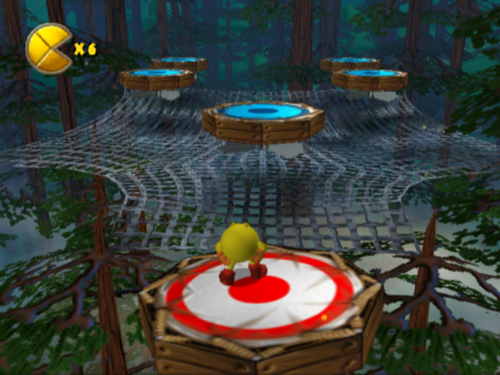
|
- The first section of directional B-Doings was simplified in revision 1.
| Revision 0 | Revision 1 |
|---|---|
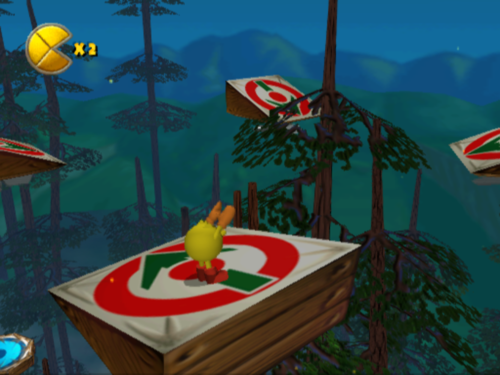 |
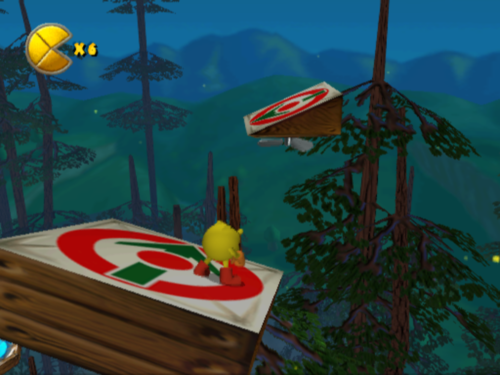
|
- Midway through the first tree climb, a checkpoint was added in revision 1.
| Revision 0 | Revision 1 |
|---|---|
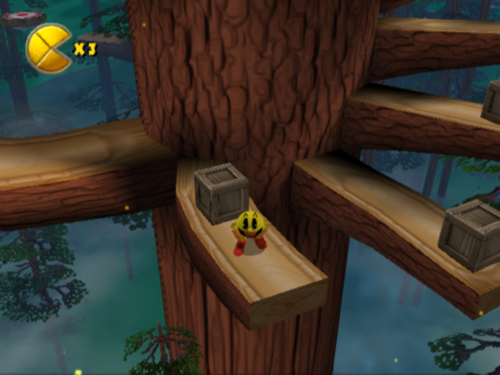 |
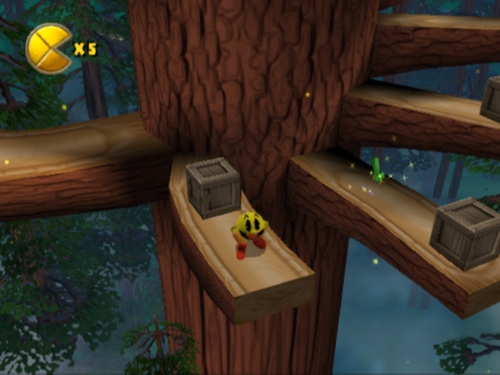
|
- After the treetop with the Galaxian, the path to move to the next checkpoint is totally different in revision 1.
- Because of these changes, a melon and some Pac-Dots were moved to other parts of the level.
Snow
- Ice River Run and Blade Mountain both have brief sequences where a Pac-Ranger gives tips about their respective stages. In revision 0, only the Ice River Run sequence exists.
Differences Between Consoles
- The GameCube version lacks any music or sound effects on the save data menu.
- Pausing in the PS2, Xbox, and Windows versions will mute the music, whereas the music will continue to play in the GameCube version.
- In the PS2 and GameCube versions, Pac-Village and the world map both use the same music track as the title screen. The Xbox and Windows versions changed this so that they instead use the same track as The Bear Basics. This also applies to the save data menu (with the aforementioned exception of the GameCube version).
- During the Ice River Run Pac-Ranger sequence, the GameCube version uses a unique version of the track used in the ice stages. This track is not present in any PS2 version and was removed from the Xbox and Windows versions, all of which simply recycle the music from Ice River Run.
- The Blade Mountain Pac-Ranger sequence lacks any music in the PS2 Greatest Hits and GameCube versions, whereas the Xbox and Windows versions use the track from the stage itself.
- Exclusively in the ending cutscene of the GameCube version, Spooky's voice is noticeably deeper, slower, and more distorted compared to other versions.
- Pages missing developer references
- Games developed by Namco
- Pages missing publisher references
- Games published by Namco
- Games published by SCEE
- Games published by Hip Games
- PlayStation 2 games
- GameCube games
- Xbox games
- Windows games
- Pages missing date references
- Games released in 2002
- Games released in July
- Games released on July 25
- Games released in February
- Games released on February 24
- Games released in March
- Games released on March 19
- Games released in October
- Games released on October 15
- Games released in May
- Games released on May 3
- Games with unused animations
- Games with unused code
- Games with hidden development-related text
- Games with unused enemies
- Games with unused graphics
- Games with unused text
- Games with debugging functions
- Games with hidden sound tests
- Games with hidden level selects
- Games with revisional differences
- Pages requiring cleanup
- To do
- To investigate
- Pac-Man series
Cleanup > Pages missing date references
Cleanup > Pages missing developer references
Cleanup > Pages missing publisher references
Cleanup > Pages requiring cleanup
Cleanup > To do
Cleanup > To investigate
Games > Games by content > Games with debugging functions
Games > Games by content > Games with hidden development-related text
Games > Games by content > Games with hidden level selects
Games > Games by content > Games with hidden sound tests
Games > Games by content > Games with revisional differences
Games > Games by content > Games with unused animations
Games > Games by content > Games with unused code
Games > Games by content > Games with unused enemies
Games > Games by content > Games with unused graphics
Games > Games by content > Games with unused text
Games > Games by developer > Games developed by Bandai Namco > Games developed by Namco
Games > Games by platform > GameCube games
Games > Games by platform > PlayStation 2 games
Games > Games by platform > Windows games
Games > Games by platform > Xbox games
Games > Games by publisher > Games published by Bandai Namco > Games published by Namco
Games > Games by publisher > Games published by Hip Games
Games > Games by publisher > Games published by Sony > Games published by Sony Interactive Entertainment > Games published by Sony Computer Entertainment > Games published by SCEE
Games > Games by release date > Games released in 2002
Games > Games by release date > Games released in February
Games > Games by release date > Games released in February > Games released on February 24
Games > Games by release date > Games released in July
Games > Games by release date > Games released in July > Games released on July 25
Games > Games by release date > Games released in March
Games > Games by release date > Games released in March > Games released on March 19
Games > Games by release date > Games released in May
Games > Games by release date > Games released in May > Games released on May 3
Games > Games by release date > Games released in October
Games > Games by release date > Games released in October > Games released on October 15
Games > Games by series > Pac-Man series
